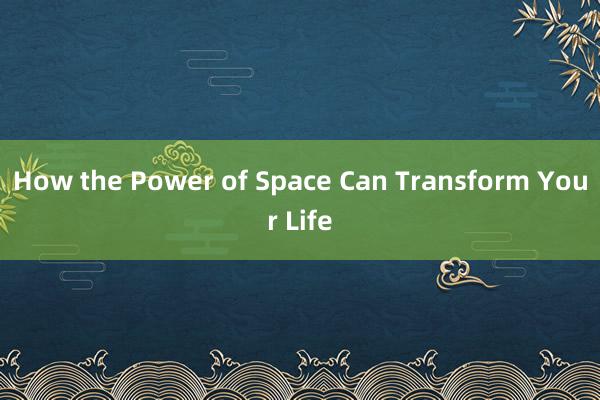How the Power of Space Can Transform Your Life

The Art of Using Space in Our Physical World

Space is one of the most important yet underappreciated resources in our modern lives. We live in a world where our schedules are jam-packed, our homes often cluttered, and our minds overwhelmed with constant distractions. But if we take a step back and embrace the power of space—"magagamit ang mga puwang"—we can unlock profound benefits that range from better productivity to increased happiness. By making conscious use of our physical and mental spaces, we can transform our lives in remarkable ways.
The Power of Physical Space
The concept of using space isn't limited to just design or architecture; it extends into how we manage our environment and the way we interact with it. Whether you're working from home, studying, or spending time with your family, the space around you has a significant impact on your mood and effectiveness.
Decluttering Your Environment
One of the first and most obvious ways to make use of space is by decluttering your environment. A cluttered room leads to a cluttered mind. Studies have shown that a chaotic environment can lead to feelings of stress, anxiety, and decreased productivity. By creating a more organized space, we can promote clarity and focus.
Start by eliminating unnecessary items. Ask yourself, "Do I need this? Does it serve a purpose?" If the answer is no, it's time to let go. A clean, minimalist environment can do wonders for your mental well-being. This principle is not just for home spaces but also applies to office spaces, where a clean desk often translates into a clearer mind and more focused work.
Designing for Purpose
Every space you inhabit should have a defined purpose. Whether it's a bedroom, a workspace, or a living area, each should be optimized for its intended use. When you're at your desk, for example, make sure that everything you need to be productive is within arm's reach—this means proper lighting, organized tools, and a comfortable chair.
Feng Shui, the ancient Chinese practice of arranging spaces to create harmony, emphasizes the importance of aligning your environment with your personal energy. It suggests that every object in your space should have a place, and every item should contribute positively to the atmosphere. By designing spaces with purpose, you can invite good energy, focus, and creativity into your daily life.
Creating Zones for Different Activities
Another effective way to use space is by creating distinct zones in your home or office. Each zone serves a specific activity or function—such as a designated workspace, a relaxation area, or a space for exercise. When you create boundaries between different activities, your brain associates each space with a specific state of mind. This makes it easier to switch between work and relaxation, leading to greater productivity during work hours and a more restful mind after hours.
Maximizing Small Spaces
Even if you don't have a large living or working area, you can still make use of the available space in smart ways. Vertical storage, multifunctional furniture, and minimalistic design can help you optimize every inch of your space. For example, in a small apartment, a fold-out desk or a sofa that doubles as a bed can save valuable space while still allowing you to complete your daily tasks. This creative approach to space can help you feel less confined and more free to move and grow.
The Psychological Impact of Space
Our relationship with space goes beyond just the physical; it extends to the psychological impact that our environment has on our mental state. Research has shown that the spaces we inhabit can influence our mood, stress levels, and even cognitive function.
The Link Between Space and Productivity
Having a space that is conducive to productivity is essential for achieving your goals. When you're surrounded by clutter, it’s easy to feel overwhelmed and distracted. On the other hand, when your space is clean, organized, and tailored to your needs, you can work more efficiently and with greater focus.
In fact, companies that invest in well-designed workspaces for their employees often see higher productivity levels,chich69 better morale, go88 tài xỉu and increased collaboration. Employees who are provided with personalized, phim rule 34 comfortable, and organized spaces tend to perform better and feel more satisfied with their work environment.
Space as a Source of Calm
Just as physical space can influence our work, it can also have a profound effect on our sense of well-being. A calming space promotes relaxation and peace. Think about the last time you walked into a peaceful garden or a cozy room with soft lighting and soothing decor. These spaces can help reduce stress levels, improve sleep, and enhance overall mental clarity.
The minimalist trend, which focuses on simplicity and the removal of excess, has gained popularity in recent years because of its psychological benefits. By eliminating distractions and creating spaces that focus on essentials, we allow our minds the space to breathe and refocus.
Nature and the Need for Space
Nature has an inherent ability to calm the mind and restore balance. Many of us are disconnected from nature due to urban living and hectic schedules. However, the importance of bringing natural elements into your space cannot be overstated. Whether it’s through plants, natural light, or simply making time to spend outdoors, these elements help create an atmosphere that supports mental well-being and relaxation.
In fact, biophilic design—an architectural concept that incorporates natural elements into interior design—has been shown to reduce stress and improve cognitive function. By connecting with nature, even in small ways, we can enhance the spaces we inhabit, making them more nurturing and restorative.
Harnessing Mental Space for Personal Growth
đăng ký đăng nhập slot go88While physical space plays a crucial role in shaping our environments and productivity, the power of mental space cannot be overlooked. Our minds, just like our surroundings, need room to breathe, grow, and thrive. By learning to use our mental space effectively, we can unlock greater clarity, creativity, and emotional well-being.
Decluttering the Mind
Just as we declutter our physical spaces, it's important to declutter our minds. A mind filled with constant thoughts, worries, and distractions can be just as overwhelming as a cluttered room. To truly make use of your mental space, you need to learn how to manage your thoughts, emotions, and attention.
Mindfulness and Meditation
Practices like mindfulness and meditation are powerful tools for creating mental space. When we practice mindfulness, we become more aware of our thoughts and feelings, allowing us to detach from them and create space for more productive, positive thinking. Meditation, on the other hand, can help clear the mind, reduce stress, and foster a sense of inner peace.
Just as physical space allows for clarity and focus, mental space allows for clear thinking and emotional balance. By committing to regular mindfulness practices, you can free your mind from unnecessary distractions and create room for personal growth and reflection.
Prioritization and Focus
In today’s fast-paced world, we’re constantly bombarded with information and tasks. The key to making use of your mental space is learning how to prioritize what truly matters. By focusing on one task at a time and avoiding multitasking, you can be more productive and effective.
Take time each day to assess your priorities and clear mental space for important activities. A simple technique like creating a to-do list or setting clear goals can help you stay focused and avoid mental overwhelm.
Emotional Clarity
Our emotions are an integral part of our mental space. Negative emotions such as anger, fear, or sadness can take up a lot of mental real estate, preventing us from moving forward. Learning to manage and process our emotions—through techniques like journaling, talking to a trusted friend, or seeking therapy—can help free up valuable mental space.
Just as you would clear out physical clutter from your home, it's important to clear out emotional clutter from your mind. This leads to greater emotional clarity, resilience, and an overall improved sense of well-being.
Expanding Your Mental Space Through Creativity
One of the most powerful ways to make use of mental space is by engaging in creative activities. Creativity is not just for artists or musicians—it’s a skill that can be cultivated by anyone and has the potential to improve your mental well-being.
Creative Expression as a Release
Whether it’s through painting, writing, cooking, or even problem-solving, creative expression allows us to release pent-up emotions and ideas. When you engage in creative activities, you give your mind a chance to wander and explore, which can lead to moments of insight, innovation, and personal growth.
Creative outlets also allow us to process complex emotions in a healthy way. If you're feeling stressed or overwhelmed, taking a few moments to draw, write, or engage in a creative project can help you reset your mind and create space for new ideas and solutions.
Innovation Through Mental Space
Creativity thrives in environments where there is freedom and space to think outside the box. By clearing mental clutter, you make room for innovative thinking and new perspectives. Whether you're brainstorming a new project, tackling a work challenge, or simply seeking to improve your personal life, creating mental space is key to unlocking creative solutions.
The Power of Rest and Recharge
Just as physical spaces need time to breathe, so too does your mind. Rest is essential for maintaining mental clarity. Taking breaks throughout the day, getting enough sleep, and allowing yourself time for relaxation are all crucial for keeping your mind sharp and creative.
When you give yourself permission to rest, you allow your mental space to recharge, which ultimately leads to better performance, greater creativity, and improved well-being.
Creating Space for Personal Growth
Finally, the ultimate benefit of making use of space—both physical and mental—is the opportunity for personal growth. By optimizing our spaces, both external and internal, we open ourselves up to new possibilities, greater happiness, and deeper fulfillment.
Whether it’s through cultivating a peaceful home environment, making room for creativity, or clearing our minds for introspection, every action we take to create space is an investment in our own development. So, take a step back, look at the spaces around and within you, and ask yourself: how can I make this space work for me?
Making use of space is not just a physical process—it’s an ongoing journey of self-discovery and improvement. By learning to optimize both our physical environments and mental landscapes, we can create lives that are more productive, creative, and meaningful.






